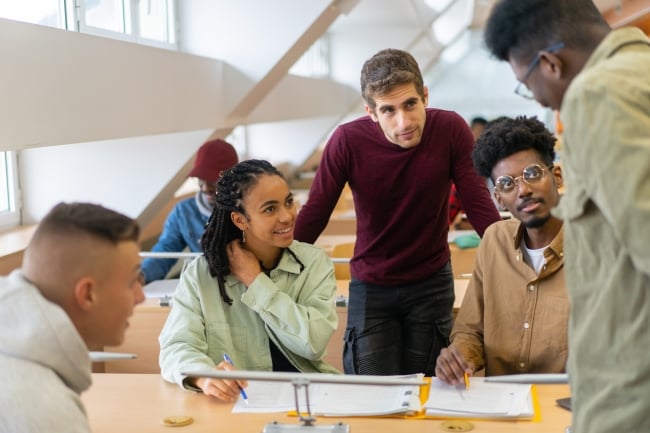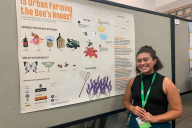You have /5 articles left.
Sign up for a free account or log in.

Colleges and universities are launching new initiatives to promote civil dialogue between students.
Vladimir Vladimirov/E+/Getty Images
A September 2023 report from the Constructive Dialogue Institute found that 45 percent of students are afraid to express their opinions in the classroom out of fear of offending their peers, and almost half are afraid to share their views on social media.
To encourage students to engage in conversations with people who may disagree with them, colleges and universities are creating courses and speaker series, holding space for students to learn from and model different disciplinary experts who disagree and find convergence.
Inside Higher Ed compiled four offerings that launched this year to help students understand and engage respectfully with the world around them.
Hollins University, Conflict and Collaboration
All first-year students at Hollins University in Virginia participate in a January-term course, Conflict and Collaboration. The course is a new general education requirement and a collaboration between various academic and student affairs departments, including the Diversity, Equity and Inclusion and Student Success, Well-Being and Belonging offices.
“This interactive course is designed to help you hone your ability to engage in constructive dialogue with others, a ‘superpower’ that can help you improve your relationships, strengthen your decision-making, pursue positive social change, and boost your professional success,” according to Hollins’s website.
In the course, students learned to hold constructive dialogue with their peers, and for the final project they worked in teams to design artifacts to help other students develop these skills.
Carnegie Mellon University, Deeper Conversations
Deeper Conversations is a universitywide initiative at Carnegie Mellon in Pittsburgh, centered on an interdisciplinary academic series on divergent viewpoints and the challenging issues of today.
Survey Says
The Constructive Dialogue Institute and More in Common surveyed 2,618 college students in the U.S. to understand their opinions on free speech and inclusion on campus.
- Ninety-four percent of students agree that “we should listen to others with an open mind, including those with whom we disagree.”
- Ninety percent of students believe “no matter how different we are, we can understand each other’s experiences by listening and empathizing.”
The initiative launched in January, and programs will include workshops and cultural events that are open to staff, faculty and students across campus.
A current offering of the initiative is an academic series hosted by the Dietrich College of Humanities and Social Sciences and the Heinz College of Information Systems and Public Policy on conflict in the Middle East and the current Israel-Hamas war. A second series on recognizing and combating hate launched Jan. 31.
Alma College, Common Sense Solutions
This semester, Alma College in Michigan launched a new course, Common Sense Solutions, focused on helping young people engage across party lines to address political issues in a constructive manner. The course unites political science and philosophy to teach students about productive problem-solving. It’s taught by Benjamin Peterson, director of the Center for College and Community Engagement, and Quinn Harr, a lecturer in philosophy.
Throughout the course, students will hear from guest speakers and take field trips to learn about various groups and interests.
As a capstone, students work together on a project to address a policy proposal on a relevant and significant issue (such as gun control, immigration or the national debt). Students are judged by a group of nonpartisan officials who will select the best solution and award a prize.
Faculty DIY
For a faculty member considering how to engage students in constructive dialogue in the classroom, a University of Delaware professor shares how she teaches this skill in the classroom. Read more here.
Dartmouth College, Dialogue Project
Beyond teaching students what a constructive dialogue should look like, Dartmouth College leaders want to give students the tools to do so themselves in curricular and co-curricular settings.
Dartmouth Dialogues launched Jan. 10, creating an umbrella of speaking series, faculty and staff training, and workshops, including the Dialogue Project. The college is also partnering with nonprofit group StoryCorps to organize and film constructive-dialogue videos to engage average college stakeholders on various topics.
How does your institution encourage students to engage in civil disagreement or constructive dialogue? Share here.







.jpeg?itok=aGrC82hx)
